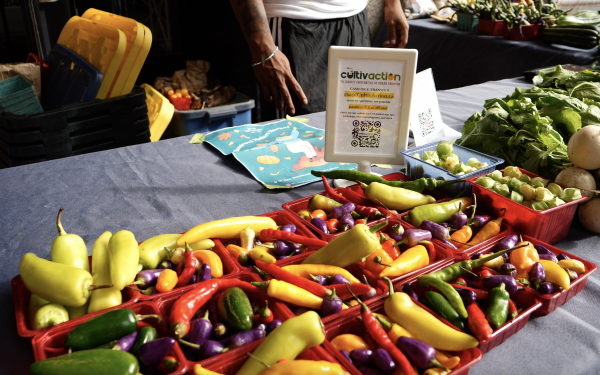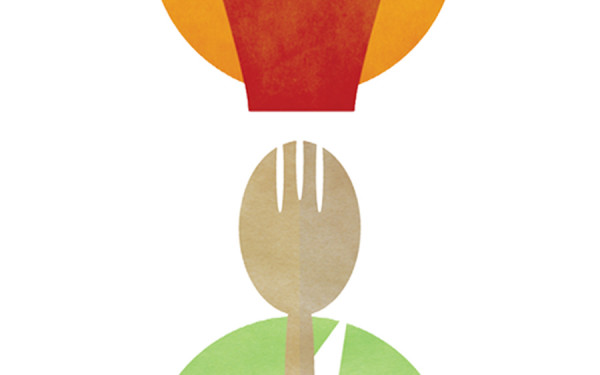Bite Me! Week Aims to Teach Concordia Alternative Food Systems
Food is the foundation of civilization. We didn’t become sedentary until we developed agriculture, and it is chiefly the demand for sustenance which birthed trade, and later, markets. So when we try to solve societal problems without acknowledging the core issue of food, we are missing the big picture.
Hyper-consumerism and our grossly exaggerated waste production begins with the way we regard food—consumers at home produce 47 per cent of all food waste in Canada (farms and restaurants combined are a fraction of that amount). If food waste were a country, the greenhouse gases produced by their decomposition would be the third biggest polluter in the world, after China and the United States—and yet half the world is starving.
This is enormous, but still we manage to avoid considering it a local problem, despite being confronted with it at every meal—at least three times a day. We distance ourselves even more from our food by having very vague ideas of where and by whom it was grown or raised, the physical distance it has crossed to reach our shelves, and ultimately—for almost half of it—our garbage, or what sacrifices the environment is shouldering to sustain our gluttonous appetites. From farm or factory to landfill, our daily interactions with food are a lot more political than most of us are led to believe.
The Concordia Food Coalition is very aware of the complexity and shortcomings of our modern food systems, and work hard to make these issues accessible to the students at Concordia. Throughout the week of Sept. 28, they are hosting Bite Me! 2015, a series of workshops and activities introducing students to food politics at Concordia.
In this third annual instalment, the CFC has invited an impressive collection of food activists to come and enrich our understanding of food. These like-minded people understand that food is sacred—amen—and have dedicated themselves to changing our paradoxical relationship with it for the better, one cause at a time. Here are a few samples of the ideas you can expect at Bite Me! this week.
Answers have been edited for conciseness and clarity.
Justice Alimentaire pour Montréal
Hugo Martorell (Project leader, Concordia student)
What is JAM? We’re trying to create a food policy in Montreal adapted to the extremely complicated political system. With the Eat-Think-Vote campaign, we’re trying to make food a national issue for the federal election.
Why is this important? A lot of policy is decided in a really complicated system, with overlapping jurisdictions and unclear roles in control. We need to facilitate this for a new management, facilitate conversations and initiatives.
What do you want people to know? There’s a need to connect people around discourse on food. Educate yourself; learn how you can get together to have an impact.
Concordia Food Groups Doc Project
Erik Chevrier (Creator, researcher, Concordia part-time professor)
What is the Project? The Concordia Student Run Food Groups Research Project was developed to preserve an institutional memory of food projects at Concordia, past, present and future. The long term of the project is to aid in the development of a more socially responsible, environmentally sustainable, cooperative food system at the university.
Why is this important? Because it is very hard to learn from the past if the past is not available.
What do you want people to know? That the Food Groups archive is a great way for students to connect with the alternative food landscape at Concordia, and find out about the people and practies that made it happen.
BonApp: Online-Based Foodsharing
Genevieve Rousseau (Co-founder)
What is BonApp? It’s the first tool to enable individuals to reduce food waste on a daily basis. We’re trying to redefine our standards of “want,” and to activate people’s generosity—it’s so much better to share than to waste.
Why is this important? Because individual consumers are half of the source of waste—but that means they can be half of the solution too. We don’t feel we’re empowered enough, so we want to create more opportunities for individuals to practice solutions.
What do you want people to know? We want them to imagine: What if we lived in a culture without want?
Campus Potager
Gabriel Townsend Darriau & Alix Tabet (Concordia students)
What is your mandate? Reclaiming unused space and making it into something fruitful. We produce organic, local, fresh, pretty cheap food for the Concordia community.
Why is this important? This might be a small project now, but it’s a foot in the door to get the university to be more responsive to bigger projects in the future. We don’t have a very big impact on a lot of people’s diets just yet, but we’re opening the possibility for other students to join and learn—it is possible to bring about change in an institution.
What do you want people to know? You don’t need to be an expert to grow food. We’re all learning together, and we’re building collective knowledge.
Indigenous Food Sovereignty
Larry McDermott (Executive Director)
What is Food Sovereignty? It is the food we have a cultural relationship with. These foods come from our environment, and we have a long cultural tradition with them. Indigenous food sovereignty reflects respect for our food, a deep gratitude and the recognition that the lives that are sustaining us are just as important as our own.
Why is this important? We need our culturally-based foods in order to keep our society healthy and vibrant, to protect our relation to the life that surrounds us. But as it is with modern food systems, we might be feeding our bodies, but we are starving our culture, our hearts and our spirits.
What do you want people to know? Supporting indigenous food sovereignty is important for the survival of all people.
Food Security and Gender Inequality
Samantha Samuels (Workshop coordinator)
What is Food Security? It’s not about having enough food on the table, as many people assume. It’s about having adequate nutrition, getting enough vitamins, minerals and calories from a variety-rich diet.
Why is this important? Because gender inequalities in rural areas actually put families’ food security at risk. The power dynamics which place financial decisions solely on men usually lead to spending in other areas with little regard for a healthy diet. This research seeks to alleviate tensions caused by gender inequalities, and to foster respect for gender equality mainstreaming in rural areas around the world.
What do you want people to know? That there are a lot of severe international issues that contrast with our local ones that we should be aware of.
The Future of Food Production on Campus
Chloe Williams (Concordia Student Union Vice-President Loyola)
What is this panel discussion about? We’re looking to increase food production here on campus. This is a part of a wider movement on campus to take control of our food system and transform it into one that is democratic, student-run and sustainable.
Why is this important? Our current food system is dominated and controlled by major corporations. By increasing food production on campus and giving students control and a say in where their food comes from, we are challenging the corporate food system, but we are also giving students healthy, organic alternatives. Through surveys over the last couple of years, students have demonstrated that this is something they want to see change.
What do you want people to know? I would tell students to get involved, to support student-run initiatives and to use their vote to continue this transformation into a student-run democratic food system.

_788_1050_90.jpg)

copy_600_375_90_s_c1.jpg)


_600_375_90_s_c1.jpg)